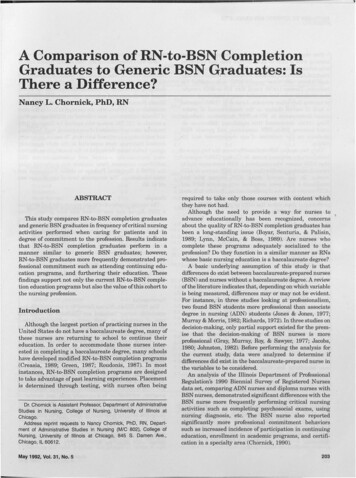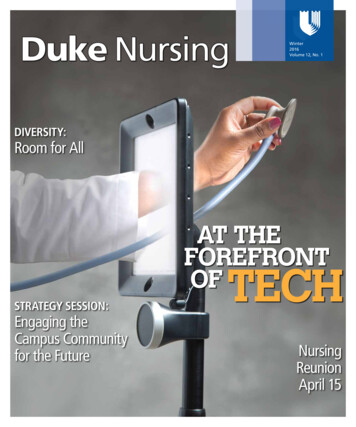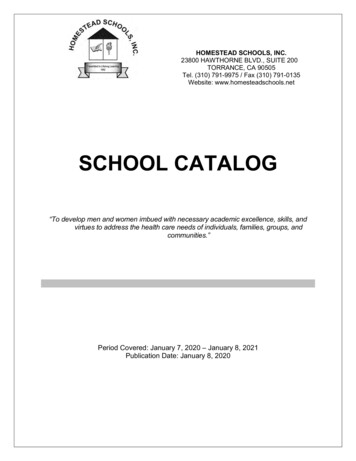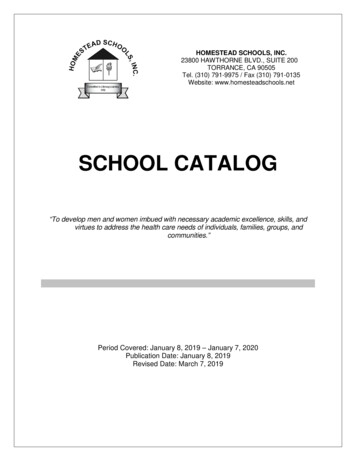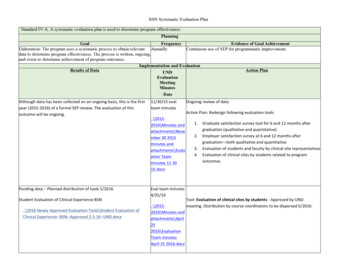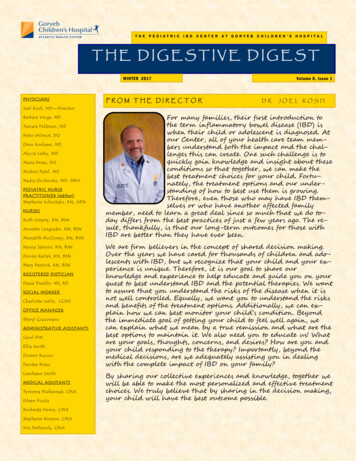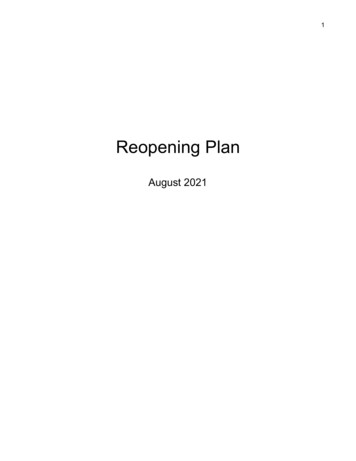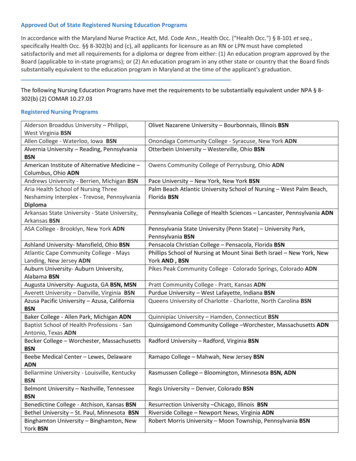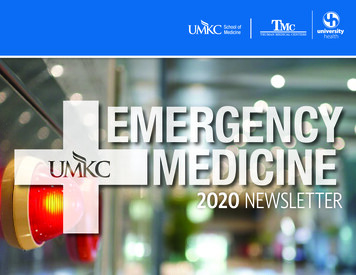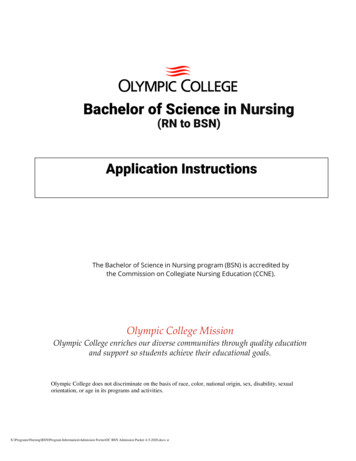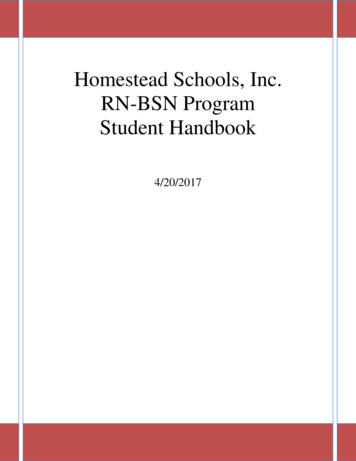
Transcription
Homestead Schools, Inc.RN-BSN ProgramStudent Handbook4/20/2017
TABLE OF lcome and AccreditationHandbook Signature PageMission, Philosophy & GoalCurriculum and Program Conceptual FrameworkANA Code of EthicsProgram Contact ListAdmission ChecklistAcademic Integrity and PoliciesCourse PoliciesAPA AND WikipediaAcademic TranscriptsFERPAAccommodation and DisabilityOnline Discussion RequirementsGrading RubricsStudent Participation in GovernanceDisclosureClinical Information and HandbookProgram Description and ObjectivesAdmission RequirementsCurriculum PlanCourse Descriptions & ObjectivesSample Program FormsAppendices Welcome to Homestead RN-BSN Program Message Canvas Login and Help Info Sheet Syllabus Signature Sheet1
HOMESTEAD SCHOOLS, INC.23800 Hawthorne Blvd., Suite 200Torrance, CA 90505Tel. (310) 791-9975 / Fax (310) 791-0135WELCOME AND ACCREDITATIONWelcome to Homestead RN to BSN nursing program handbook. We are delighted to have you inthe program. There are three tracks for degree completion of the RN-BSN program:1. Residential: Offered face-to-face on campus in Torrance.2. Online: Offered 100% online via asynchronous, synchronous, and other online deliverymethods.3. Blended: Mixture of online and on-campus courses as elected by the student. The samecourses will be offered both online and on campus.The RN to BSN degree program is based on current trends in nursing education, praxisphilosophy and on the “The Essentials of Baccalaureate Education for Professional NursingPractice” outlined by the American Association of Colleges of Nursing (AACN). Concepts suchas self-care, holism, patient safety from the Quality and Safety Education for Nurses (QSEN) andother nursing models are also adopted to align with and evaluate the curriculum.The program is approved by the Accrediting Bureau of Health Education Schools (ABHES).Currently, the program is a new applicant pursuing initial accreditation by the Commission onCollegiate Nursing Education (CCNE).2
Handbook Signature and Acknowledgement PagePlease take some time to review the Student Handbook and indicate that you have read the entirecontent of the handbook for the RN to BSN program. As a student in the program, you areresponsible for understanding the policies and contents.Acknowledgement: Please make a copy of this page or print it out online. Sign and submit thesigned copy to the admission coordinator during your program orientation and prior to startingthe program. Please refer to the handbook regularly.Name:Signature:Date:3
Mission, Philosophy and GoalMissionThe mission of the RN to BSN program is “to prepare quality praxis-driven professional nursesthat can function with strong critical thinking and leadership skills as providers of care,designers-managers-coordinators of care and members of a profession.” The above statementsupports Homestead Mission: “to develop men and women imbued with necessary academicexcellence, skills, and virtues to address the health care needs of individuals, families, groups,and community.”Philosophy and Goal:The nursing program’s vision is to prepare quality professional nurses who can think criticallyfrom a praxis perspective to promote equity and quality health care. The goal of the program is tograduate nurses that will be ready to advance their educational career and that can understand theconcept of holistic praxis, think critically, and serve as change agents or leaders in any healthcare and nursing environment.The Curriculum and Conceptual Framework:This holistic praxis-driven curriculum which is based on Praxis philosophy with integration of“The Essentials of Baccalaureate Education for Professional Nursing Practice” outlined by theAmerican Association of Colleges of Nursing (AACN), promotes the holistic thinking process inboth nursing and academic practices with a focus on the following critical concepts as presentedin the conceptual framework:1. Professionalism2. Holism3. Cultural Diversity4. Communication5. Health Promotion6. Quality and Safety7. Critical Thinking8. Team Work and Collaboration9. Evidence-Based Practice10. Competent Leader4
The Essentials of Baccalaureate Education for Professional Nursing Practice address the keystakeholders’ recommendations and landmark documents such as the Institute of Medicine’s(IOM) recommendations for the core knowledge required of all healthcare professionals.Concepts such as patient centered care, interprofessional teams, evidence based practice, qualityimprovement, patient safety from the Quality and Safety Education for Nurses (QSEN),informatics, clinical reasoning/critical thinking, genetics and genomics, cultural sensitivity,professionalism, and practice across the lifespan in an ever changing and complex healthcareenvironment are aligned with the curriculum.Homestead RN-BSN Program Conceptual FrameworksNursingPRAXIS LEADER & PROFESSIONAL NURSEHealthProfessionalismAccountabilityCultural DiversityCommunicationCollaborationHealth PromotionQuality & SafetyCritical ThinkingTeam WorkEvidence-Based PracticePersonCompetent LeaderEnvironmentRN-BSN Program Conceptual Framework5
The RN-BSN program upholds the mission of Homestead Schools in supporting the educationaland lifelong learning needs of a multicultural community. The Nursing Faculty is in agreementwith the objectives and mission statement of the college and ascribes to the following beliefs:The faculty believes that nursing is the protection, promotion, and optimization of health andabilities, prevention of illness and injury, facilitation of healing, alleviation of suffering throughthe diagnosis and treatment of human response, and advocacy in the care of individuals, families,groups, communities, and populations. Nursing, as a specialized health service, is distinguishedfrom other human services by its focus on persons with inabilities for continuous provision of theamount and quality of time specific care that is regulatory of their own functioning anddevelopment whenever inabilities that limit care are associated with their states of health.Health is used in the sense of state of a person that is characterized by soundness or wholenessof developed human structures and of bodily and mental functioning.The faculty defines the environment as the sum of all internal and external factors affecting thehealth and self-care abilities of all people. The faculty believes that the environment is utilizedby the nurse to enhance the client’s health, well-being, and self- care abilities. The reciprocalrelationship between the person and environment is influenced by both internal and externalfactors. Environmental factors affect the therapeutic self-care demands of individuals. Humanbeings are never isolated from their environments. They exist in them.The faculty believes that a person is a human being capable of holistic self-care. It is the view ofpersonalization of the individual, that is, movement toward maturation and achievement of theindividual’s human potential. He is a human being who has the actual or potential attribute ofself-care agency that allows him to deliberately learn and perform actions for survival, health,and well-being.The faculty views a dynamic interaction among nursing, health, environment, and person to meetthe program’s mission: “to prepare quality praxis-driven professional nurses that can functionwith strong critical thinking and leadership skills as providers of care, designers-managerscoordinators of care and members of a profession.Praxis - is a synthesis of thoughtful reflection, caring, and action within a theory and researchdriven practice.Professional Nurse - is an individual prepared with a minimum of a baccalaureate in nursingwhich is the foundation upon which all graduate nursing education builds.The professional nurse practices in a multicultural environment and expected to perform thefollowing roles of the baccalaureate generalist nurse:6
1. Baccalaureate Generalist nurses are providers of direct and indirect care. In this role,nurses are patient advocates and educators. Historically, the nursing role has emphasizedpartnerships with patients – whether individuals, families, groups, communities, orpopulations – in order to foster and support the patient’s active participation indetermining healthcare decisions. Patient advocacy is a hallmark of the professionalnursing role and requires that nurses deliver high quality care, evaluate care outcomes,and provide leadership in improving care.Changing demographics and ongoing advances in science and technology are a reality ofhealthcare practice. The generalist nurse provides evidence-based care to patients withinthis changing environment. This clinician uses research findings and other evidence indesigning and implementing care that is multidimensional, high quality, and costeffective. The generalist nurse also is prepared for the ethical dilemmas that arise inpractice and will beable to make and assist others in making decisions within a professional ethicalframework. Understanding advances in science and technology and the influence theseadvances have on health care and individual wellbeing is essential. Understandingpatients and the values they bring to the healthcare relationship is equally important.The generalist nurse practices from a holistic, caring framework. Holistic nursing care iscomprehensive and focuses on the mind, body, and spirit, as well as emotions. Thegeneralist nurse recognizes the important distinction between disease and the individual’sillness experience. Assisting patients to understand this distinction is an important aspectof nursing. In addition, nurses recognize that determining the health status of the patientwithin the context of the patient’s values is essential in providing a framework forplanning, implementing, and evaluating outcomes of care.The generalist nurse provides care in and across all environments. Nurses focus onindividual, family, community, and population health care, as they monitor and manageaspects of the environment to foster health.*2. Baccalaureate generalist nurses are designers, coordinators, and managers of care. Thegeneralist nurse, prepared at the baccalaureate degree level, will have the knowledge andauthority to delegate tasks to other healthcare personnel, as well as to supervise andevaluate these personnel. As healthcare providers who function autonomously andinterdependently within the healthcare team, nurses are accountable for their professionalpractice and image, as well as for outcomes of their own and delegated nursing care.Nurses are members of healthcare teams, composed of professionals and other personnelthat deliver treatment and services in complex, evolving healthcare systems. Nurses bringa unique blend of knowledge, judgment, skills, and caring to the healthcare team.*3. Baccalaureate generalist nurses are members of the profession and in this role areadvocates for the patient and the profession. The use of the term “professional” impliesthe formation of a professional identity and accountability for one’s professional image.As professionals, nurses are knowledge workers who use a well delineated and broadknowledge base for practice. Professional nursing requires strong critical reasoning,7
clinical judgment, communication, and assessment skills. The professional nurse alsorequires the development and demonstration of an appropriate set of values and ethicalframework for practice. As advocates for high quality care for all patients, nurses areknowledgeable and active in the policy processes defining healthcare delivery andsystems of care. The generalist nurse also is committed to lifelong learning, includingcareer planning, which increasingly will include graduate level study.**(The Essentials of Baccalaureate Education for Professional Nursing Practice outlined by theAmerican Association of Colleges of Nursing (AACN), 2008)To carry out these roles, the following components are expected to possess by each professionalnurse:1. Professionalism - is defined as the consistent demonstration of core values evidenced bynurses working with other professionals to achieve optimal health and wellness outcomesin patients, families, and communities by wisely applying principles of altruism,excellence, caring, ethics, respect, communication, and accountability.2. Accountability - Is defined as being responsible and answerable for action or inactionsof self or others in the context of delegation.3. Cultural Diversity – is the range of human variation, including age, race, gender,disability, ethnicity, nationality, religious and spiritual beliefs, sexual orientation,political beliefs, economic status, native language, and geographical background.4. Communication – is the integration of effective culturally sensitive, inter-professionaland intra-professional communication among the healthcare team and the use ofinformatics in the practice of professional nursing.5. Health Promotion - the advancement of health through the encouragement of activitiesthat enhance the client’s wellness.6. Quality – refers to effectiveness of clinical care and effectiveness of inter-personal care.7. Safety – is defined as the minimization of “risk of harm to patients and providers throughboth system effectiveness and individual performance”.8. Critical thinking – is the ability to think in a systematic and logical manner withopenness to question and reflect on the reasoning process used to ensure safe nursingpractice and quality care.9. Teamwork and Collaboration – Function effectively within nursing and interprofessional teams, fostering open communication, mutual respect, and shared decisionmaking to achieve quality patient care.10. Evidence-based Practice – is a care that integrates the best research with clinicalexpertise and patient values for optimum care.8
ANA Code of Ethics for Nurses1. The nurse, in all professional relationships, practices with compassion and respect for theinherent dignity, worth, and uniqueness of every individual, unrestricted by considerations ofsocial or economic status, personal attributes, or the nature of health problems.2. The nurse's primary commitment is to the patient, whether an individual, family, group, orcommunity.3. The nurse promotes, advocates for, and strives to protect the health, safety, and rights of thepatient.4. The nurse is responsible and accountable for individual nursing practice and determines theappropriate delegation of tasks consistent with the nurse's obligation to provide optimum patientcare.5. The nurse owes the same duties to self as to others, including the responsibility to preserveintegrity and safety, to maintain competence, and to continue personal and professional growth.6. The nurse participates in establishing, maintaining, and improving health care environmentsand conditions of employment conducive to the provision of quality health care and consistentwith the values of the profession through individual and collective action.7. The nurse participates in the advancement of the profession through contributions to practice,education, administration, and knowledge development.8. The nurse collaborates with other health professionals and the public in promotingcommunity, national, and international efforts to meet health needs.9. The profession of nursing, as represented by associations and their members, is responsiblefor articulating nursing values, for maintaining the integrity of the profession and its practice,and for shaping social policy.Copyright: American Nurses Association, Code of Ethics for Nurses with InterpretiveStatements, Silver Spring, MD: American Nurses Publishing, 2001.9
Homestead RN- BSN ProgramProgram ContactsNamePhonePositionEmail Contact InformationVijay Fadia(310) 791-9975School Presidentvijayfadia@homesteadschools.comRaffy Tolentino(310) 791-9975Chief AjmalMohammad(310) 791-9975Chief omAdel Blanco(310) ols.comKevin Lee(310) ge Dayrit(310) 791-9975Financial AidDirector /AdmissionsDirectorTech Supportgeorgedayrit@homesteadschools.comJeanette Villaraza (310) 791-9975Ron RosalesAdel BlancoChristy Magles(310) 791-9975AdmissionsCoordinator(310) 791-9975ClinicalCoordinator(310) 791-9975 Chief ols.comchristymagles@homesteadschools.comAdel BlancoAjmalMohammadStephan Scoggins(310) 791-9975(310) 508-8693Full Time FacultyFull-time d@homesteadschools.com(310) 791-9975Part Time Facultystephanscoggins@homesteadschools.comVince Jugo(310) 594-9153Part Time Facultyvincejugo@homesteadschools.com10
Homestead Schools Inc.RN – BSN Program Admission ChecklistName of Student Admission 5262728293031Completed Required ItemDateFolder CreatedApplication Form CompletedApplication Fees PaidGovernment (Gov) Photo ID in FolderType of Gov IDGov. Photo ID Verification and DocumentationID Verified in Person of byRN License in folderRN License VerifiedOfficial Transcripts in File and CorrectGE Transcripts Verified and CorrectPending GE CreditsAccreditation Verification for GE CreditsUpper Level Credit Verified and Credit Amount *Enter or NA:Financial Application CompletedResult of Financial ApplicationBackground and Credit ChecksEnter or NA:Disclosure Forms Completed and SignedInterview Completed byClinical Handbook Reviewed and SignedPotential Clinical Site and Preceptor IdentifiedLetter from clinical site and Preceptor ResumeClinical Site and Preceptor forms SignedReceived a Copy of Schools CatalogReceived a copy of Program Plan and StudentHandbookHandbook Signature SheetOrientation CompletedAdvisement Completed and Program Plan SignedAttendance, Participation Policy SignedCommentSignOff by*See FormDateAdmission Coordinator Final Review Date and Signature:By signing my name in the space provided below, I verify that I have read, fully understand and agreewith the above admissions documentation and disclosure form.Print Name (Student) Student Signature11
Academic and Course PoliciesAcademic Integrity, Plagiarism, and Other PoliciesPlease review the value and mission statements of the school. We expect personal responsibilityand accountability from all students enrolled in any course as outlined in the student handbook.Any act of plagiarism will not only be rewarded with a zero grade but the student will bereported to the Chief Academic Officer every time who will enforce the academic integritypolicy. No cheating or plagiarism is allowed by any students. Cheating include copying and pasting without proper credit to the author or stealingcontent from the work of other or from another Original Work. It is worse thanplagiarism.Plagiarism is the practice of taking someone else's work or ideas and passing them off asone's own. It is the same as copying, infringement of copyright, piracy, theft, stealing etc.PLAGIARISM is also cheating of any kind (by the student or by anyone on my behalf ofthe student) in the classroom or in clinical. Plagiarism violates the central core of theprogram philosophy. It involves stealing another persons’ work (online, web, article,books, etc.) and claiming it as one’s own without credit. It can be simply copying andpasting.Punishment for Plagiarism: Any plagiarism will be punished at all times if proven. Thefirst time will require a warning and education. Second time will require a zero grade forthe assignment and a note in the student academic file. Third time the student will fail thecourse and will have ONLY one attempt to repeat that course if appeal is successful. Ifthe student appeal is not successful, the student will be expelled from the program.Paraphrasing is a form of plagiarism if not done correctly. However, paraphrasing withproper citation, reference, and/or bibliography is the best way to avoid plagiarism.Consequences and Sanctions: Punishment for cheating and plagiarism.Academic Integrity is required by ALL students. That means every students must be surethat all assignments, discussion postings, and issues addressed in the disclosure form arestrictly adhered to. Integrity is honesty to self and to others. The lack of academicintegrity will be treated as cheating and plagiarism and the student will be subject topunishment.Academic Appeal Process. Every student has the right to appeal any punishment awardedfor lack of academic integrity by going through the academic appeal process.Lack of Academic Integrity Policy. Any student found with a lack of academic integrityas presented above will be referred to the Chief Academic Officer who is responsible forenforcing the academic integrity policies.12
Academic Support SpecialistSpecialist: Please contact the student academic support specialist if you are having questionabout your course that cannot be resolved by your instructor. As a last result, you can contact theprogram director or the chief academic office or the schools administrator.Student with DisabilityAny student with disability or who requires accommodation for learning is to contact thedisability support services immediately. If you are a student with a disability or disablingcondition, or if you think you may have a disability, please contact the Disability SupportServices during the admission period or during orientation into the program.Course PoliciesOrientation and Program Success: One of the goals of the program is to help students achievesuccess by providing then with quality courses and training. Students with learning needs mustbegin their ADA process as soon as admitted. To support student success all students mustcomplete the required tech and Canvas orientation prior to taking courses in the program. Alsosome of the outcomes of this program or the competencies that will be evaluated using theQuality and Safety Education for Nurses (QSEN) Model are communication, professionalism,and quality.Incompletes: Students who cannot complete their course work prior to the end of a semester enddate may request additional time from their instructor if they have completed a minimum of 70percent of the course assignments. If approved by the program director, the students will pay aone-time fee of 500 for every incomplete and financial aid cannot be used for any incomplete.Once an incomplete is granted the student will be given a maximum of two weeks after the finalday of that semester to complete the course. The student will work with the instructor tocomplete the work. The instructor will submit a grade after the extra time provided and thetemporary grade of I (incomplete) will be changed by the instructor with a note to the programdirector. Failure to complete all requirements for the course within the two weeks will result in afinal of C, D, E, F grade that cannot be appealed. If the student receives a C, D, or F grade, thestudent will be required to re-enroll in the course and pay the appropriate tuition.Drops and Withdrawal: Students need to contact their program coordinator and academicadvisor in order to drop a course after working out all options with the instructor. The studenthas two weeks from the start of a course to drop any course without penalty. After two weeks,the dropped course will not appear on the student’s transcript. All refunds will be processed bythe financial aid director.13
Late Registration: Students who fail to register during the scheduled registration period or priorto the first day of class will follow the same drop and withdrawal policy. Late registration willnot change the academic or course policiesHoliday Schedule: All holidays will be observed on the day of the holiday. That means studentsare not required to post on that day or submit assignments on holidays. If an assignment or postis due on a holiday, the students will be given an additional day to complete the post, assignment,or require group work.Grading Policies: Course grades are based on evaluations of student’s mastery of courseobjectives as indicated and published in the approved course syllabus.Grading Scale80% is required to pass the course95-10090-9485-8983-8480-82Below 80 (Failed)A AAB BB-RN to BSN Progression: The standard of performance required for undergraduate nursingprograms is B (80%) or higher in all nursing courses. Students who earn a grade of less than B inthe program must repeat the course and earn at least a B in order to complete the program ofstudy. If a student's GPA falls below 2.5 he or she may be placed on academic probation. Allstudents on academic probation must see the program tutor and coordinator for supportSubmission Deadlines: All assignment and discussion submissions or posts are due no laterthan 11:59 p.m. P.T. of the due date, unless otherwise indicated. Please contact your instructorbefore the due date if you are going to be late with legitimate justifiable reason.Late Work: Part of professional expected behavior is to submit all assignment on a timelymanner. With life and death situation, late assignments will be accepted with prior notificationand permission from the faculty of record or the faculty teaching the course. Late assignmentswithout prior permission will earn a zero. All assignments must be completed to receive asatisfactory grade for the course. Incomplete grade is only granted in life and death situation.Netiquette or Code of Conduct” If you have not done so during orientation to the program,please go to the American Nurses Association (ANA) website and print and read the ANA Codeof Ethics for nurses. Then go to the netiquette website www.albion.com and review some basic14
rules for online communication and learning. Remember that there are differences betweenonline communication and social network communication.Additionally, when communicating online, please remember that recipients of your messagecannot hear your voice or see your face. Therefore, be respectful of other participants, their time,and their opinions. Remember that you are communicating with people who do not have theadvantage of seeing your body language or hearing your voice inflections, and who may interpretyour message differently than you intended.Please do not use ALL CAPS as presented as it can be interpreted as shouting. Use humor orsarcasm carefully as everyone does not always find the same idea funny. Be honest and keepyour critiques constructive; antagonistic criticism is called "flaming" and may cause an unwantedand unnecessary reaction online and offline. Be sure to review the comments before posting to besure you are not distracting others with poor quality work and writing. Please check yourspellings and grammar and get a proof reader if needed.APA AND WIKIPEDIAAPA: Homestead Schools RN to BSN Program adopted the Publication Manual of the AmericanPsychological Association (APA) style as its official citation reference guide. Please use APAfor all assignments in the program. A sample APA guide can be accessed at www.apastyle.orgAbout Wikipedia : Please be informed that Wikipedia is not accepted as a credible or scholarlyreference source. Wikipedia is an online open-content encyclopedia. That means any one (meand you) with an internet access can go into Wikipedia to make changes intentionally orunintentionally.Academic TranscriptsAn academic transcript is an official and complete copy of a student's academic work,which includes any official academic actions or changes, such as degrees, transfers orproficiency credit, special academic status, withdrawals or dismissals. All permanent academicrecords including transcripts are to be submitted prior to admission and will be stored by theregistrar.15
FERPA RIGHTS and Access to Student Academic RecordsAll student education records are protected by the Family Education Rights and Privacy Act of1974 (FERPA). Education records are all records directly related to the student. FERPA affordsstudents certain rights with respect to their education records. These rights include:1. The right to inspect and review the student’s education record(s) within 45 days of the day theregistrar receives a written request for access.2. The right to request the amendment of the students education records that the student believesis inaccurate, misleading or in violation of their privacy rights. A written request for amendmentthat fully describes the specific reason(s) for the requested change must be given to the registrar.3. The right to consent to disclosure of personally identifiable information contained in thestudents education records, except to the extent that FERPA authorizes disclosure withoutconsent.4. The right to file a complaint with the U.S Department of Education concerning alleged failuresof the university to comply with the requirements of FERPA. The office that administers FERPAis:Family Policy Compliance OfficeU.S Department of Education400 Maryland Avenue, SW, Washington, D.C. 20202-8520Student Accommodation and ADA RequirementAll students seeking accommodation under Section 504 of the Rehabilitation Act or theADA must submit documentation of physical or mental disability from qualified medical ortesting personnel. Expenses incurred in obtaining such documentation are the responsibility ofthe student. The following documentation should be forwarded to the Program Coordinator onadmission or at any time concurrent with a request for accommodations.Applicants, prospective students or current students with disabilities have the following rights:1. Have the right to equal access to all programs.2. Disability records will be maintained separately from academic records; dis
Homestead Schools, Inc. RN-BSN Program Student Handbook . 4/20/2017 . 1 TABLE OF CONTENTS . PAGE . 2 Welcome and Accreditation 3 Handbook Signature Page 4 Mission, Philosophy & Goal Curriculum and Program Conceptual Framework . 9 ANA Code of Ethics 10 Program Contact List .
